General, Sir John Monash, Personal Files Book 20, 15 August - 8 September 1918 - Part 9
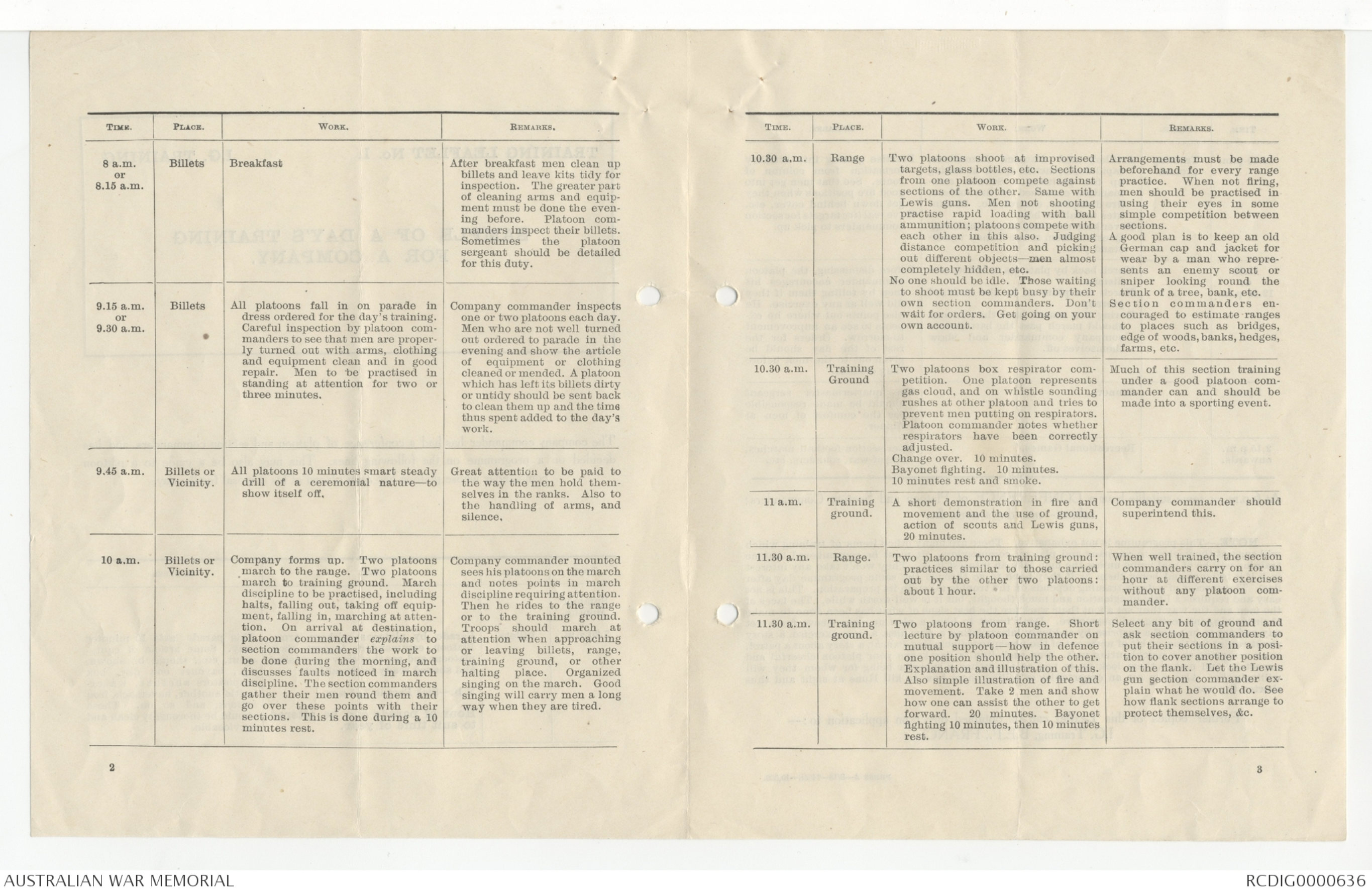
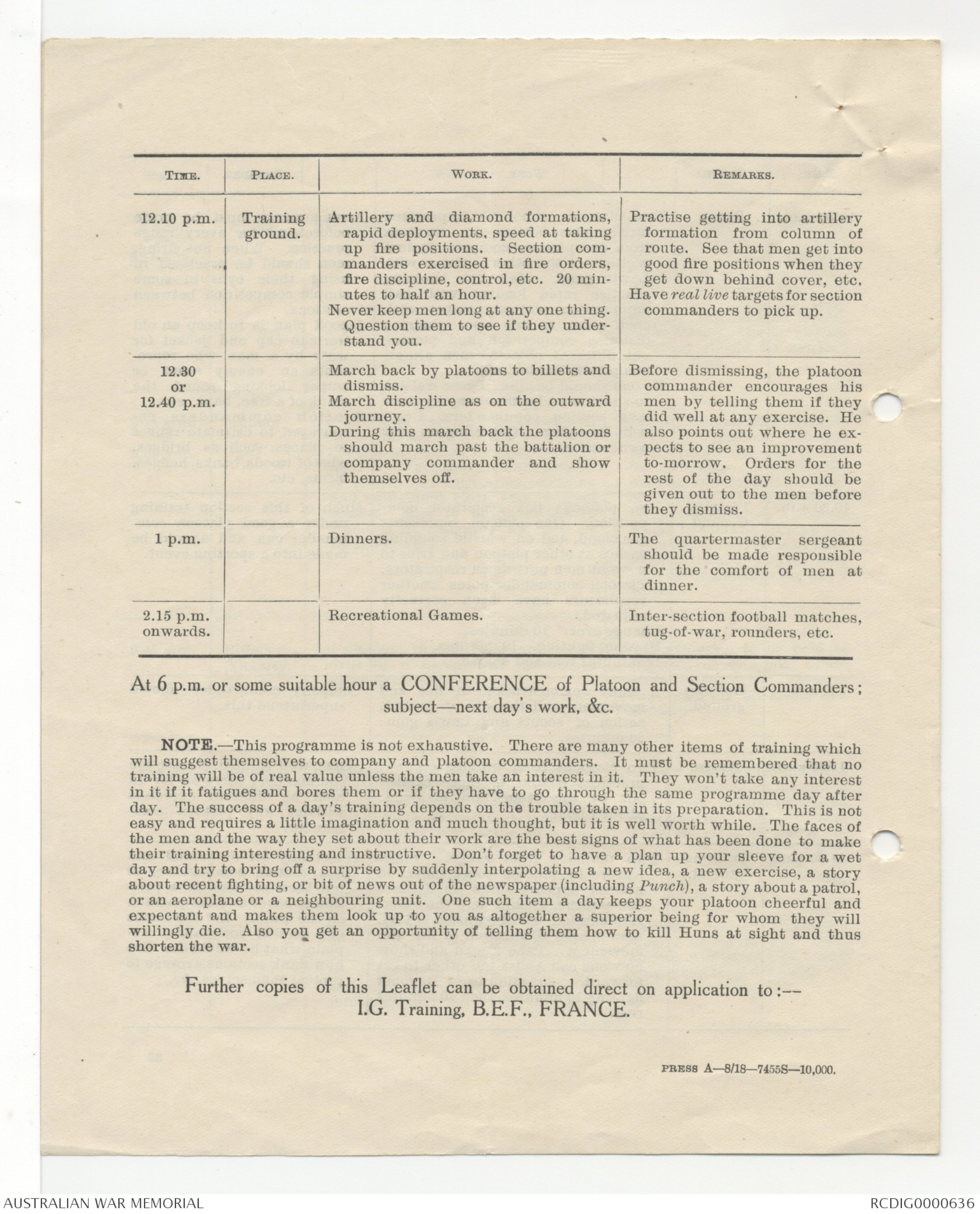
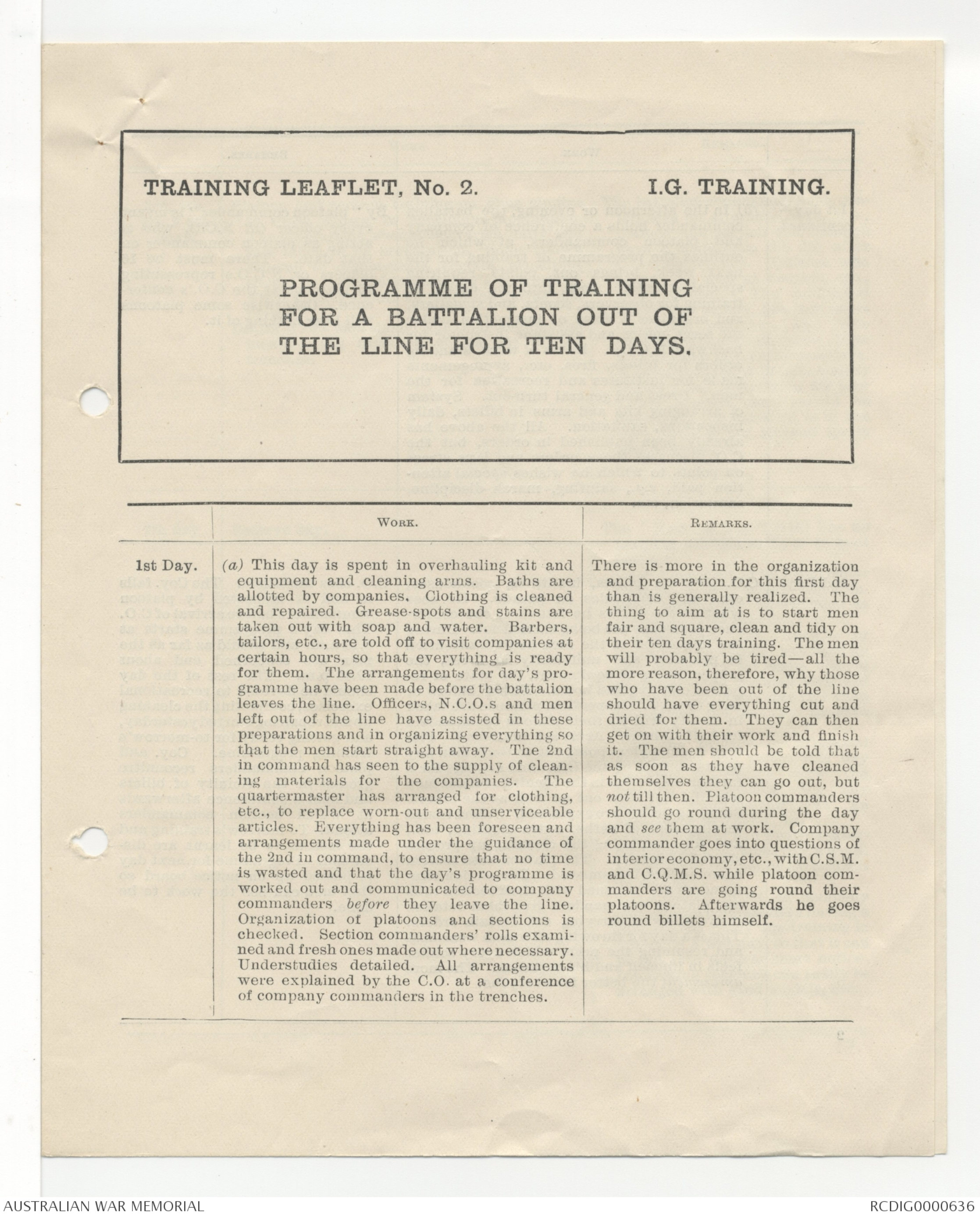
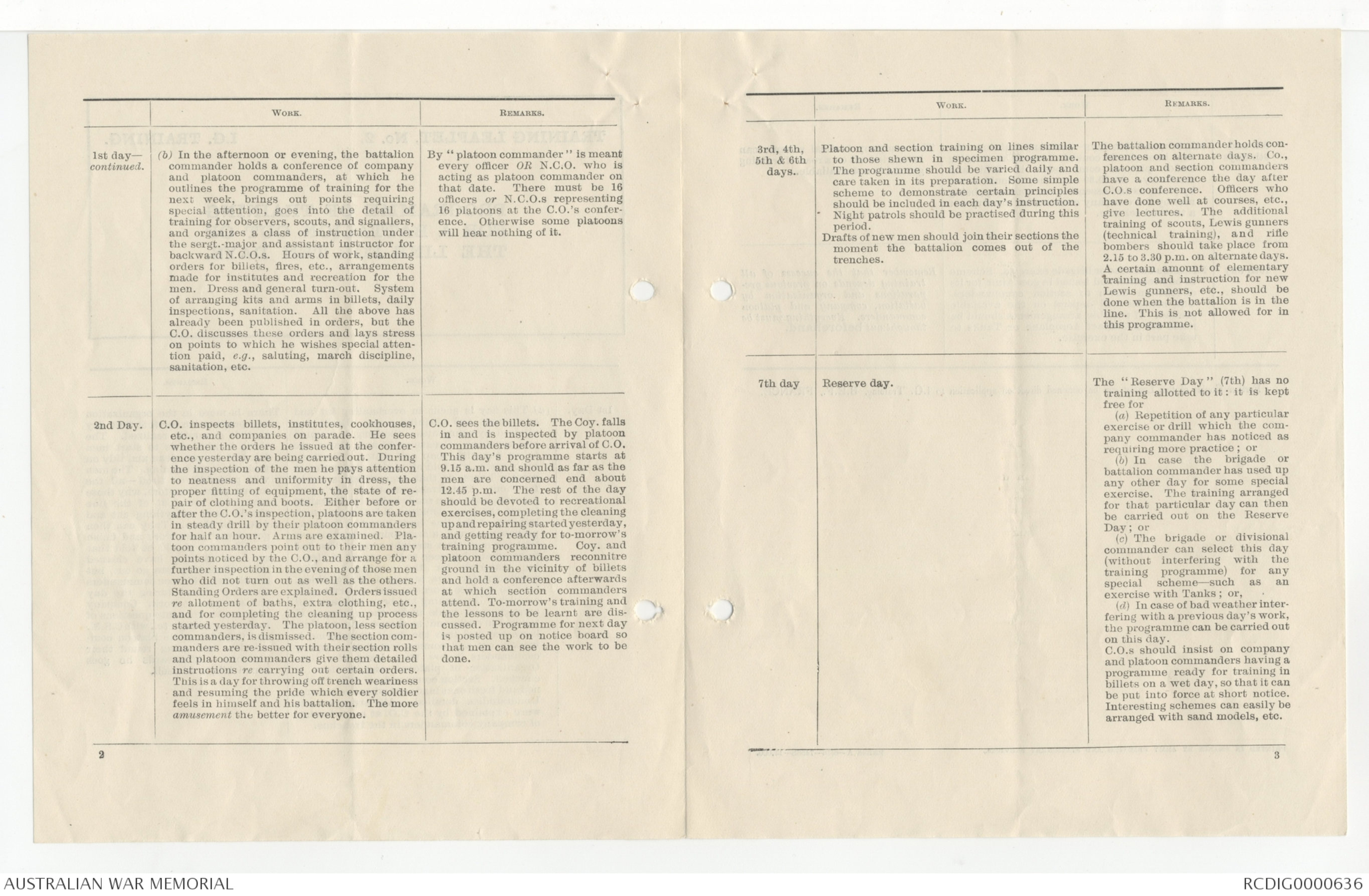
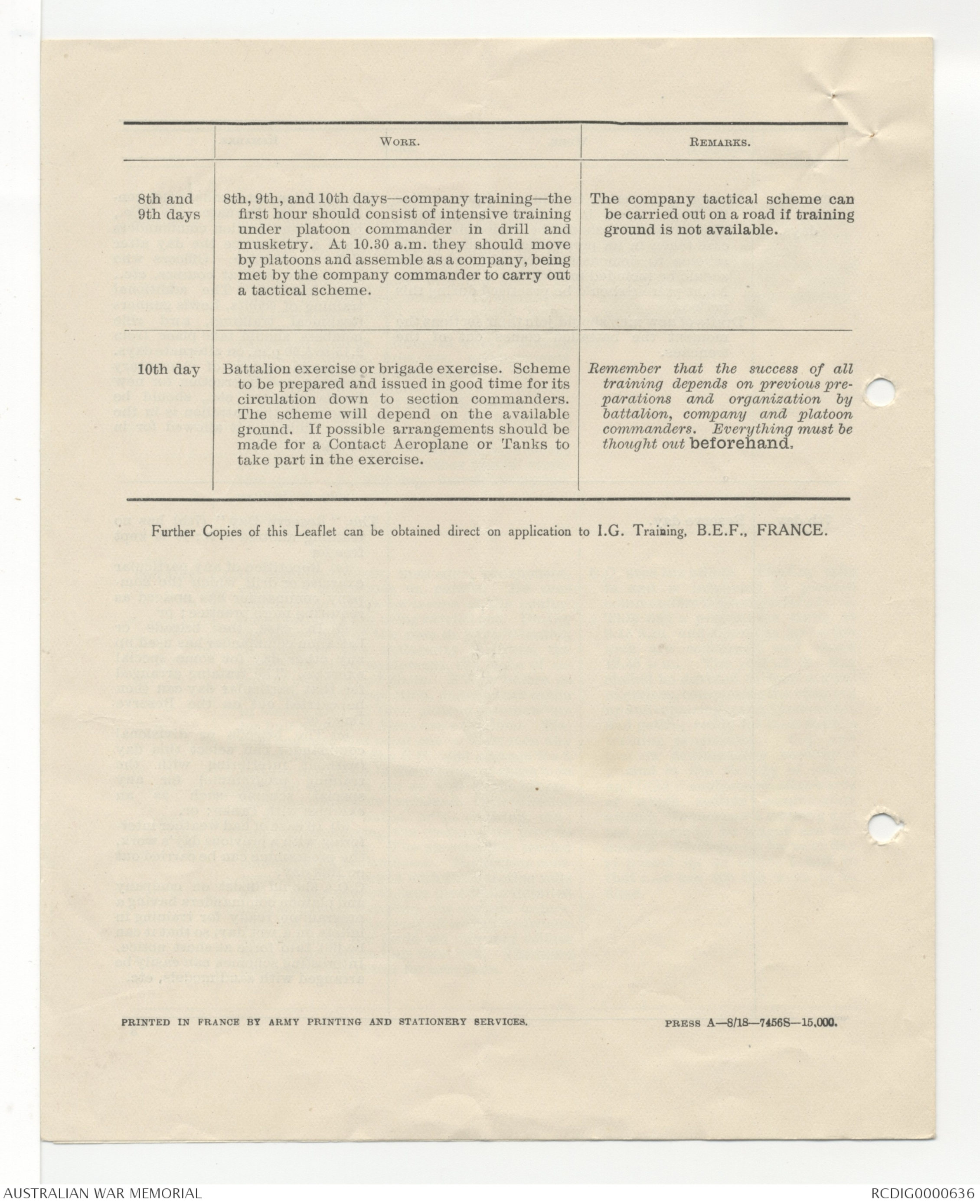
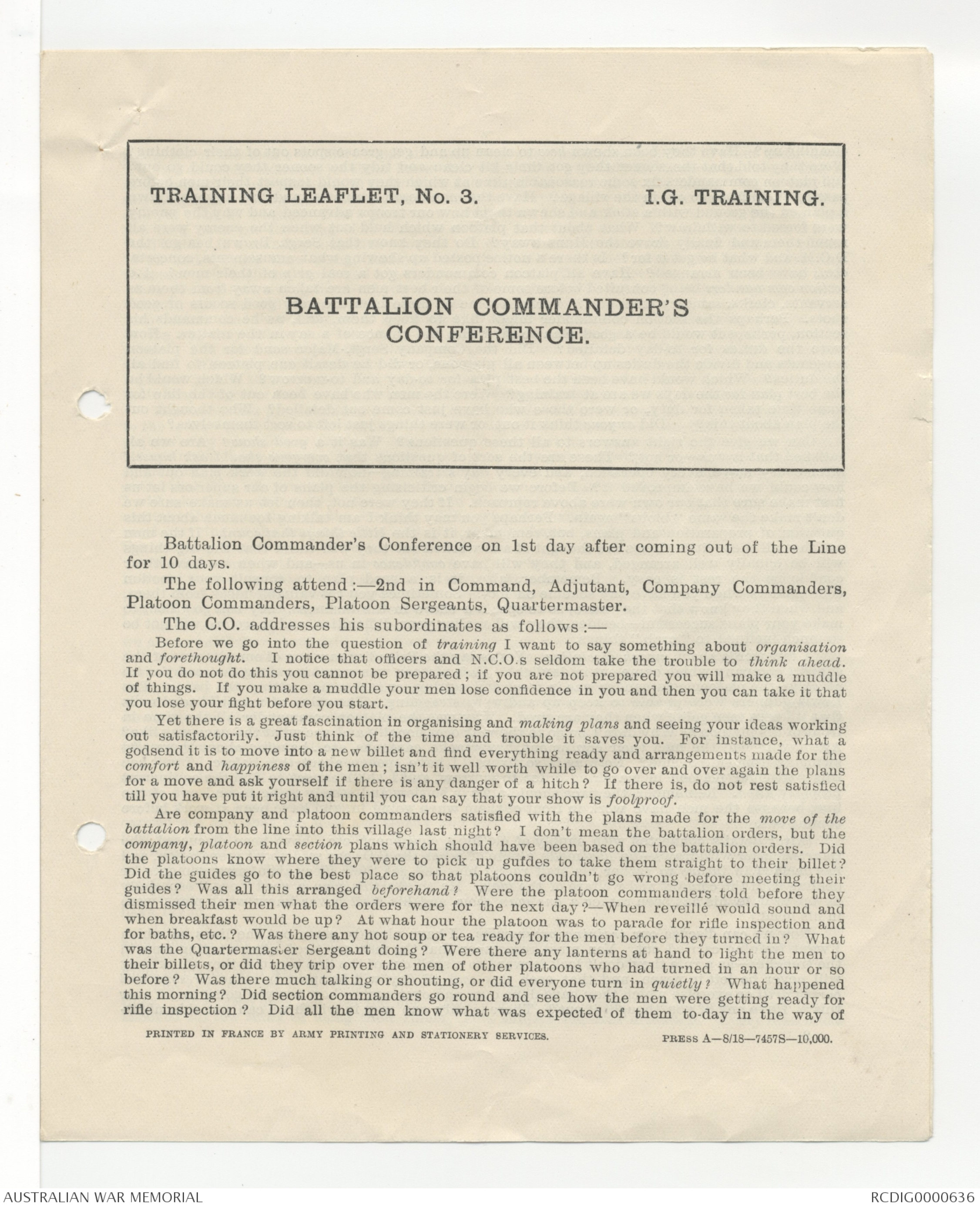
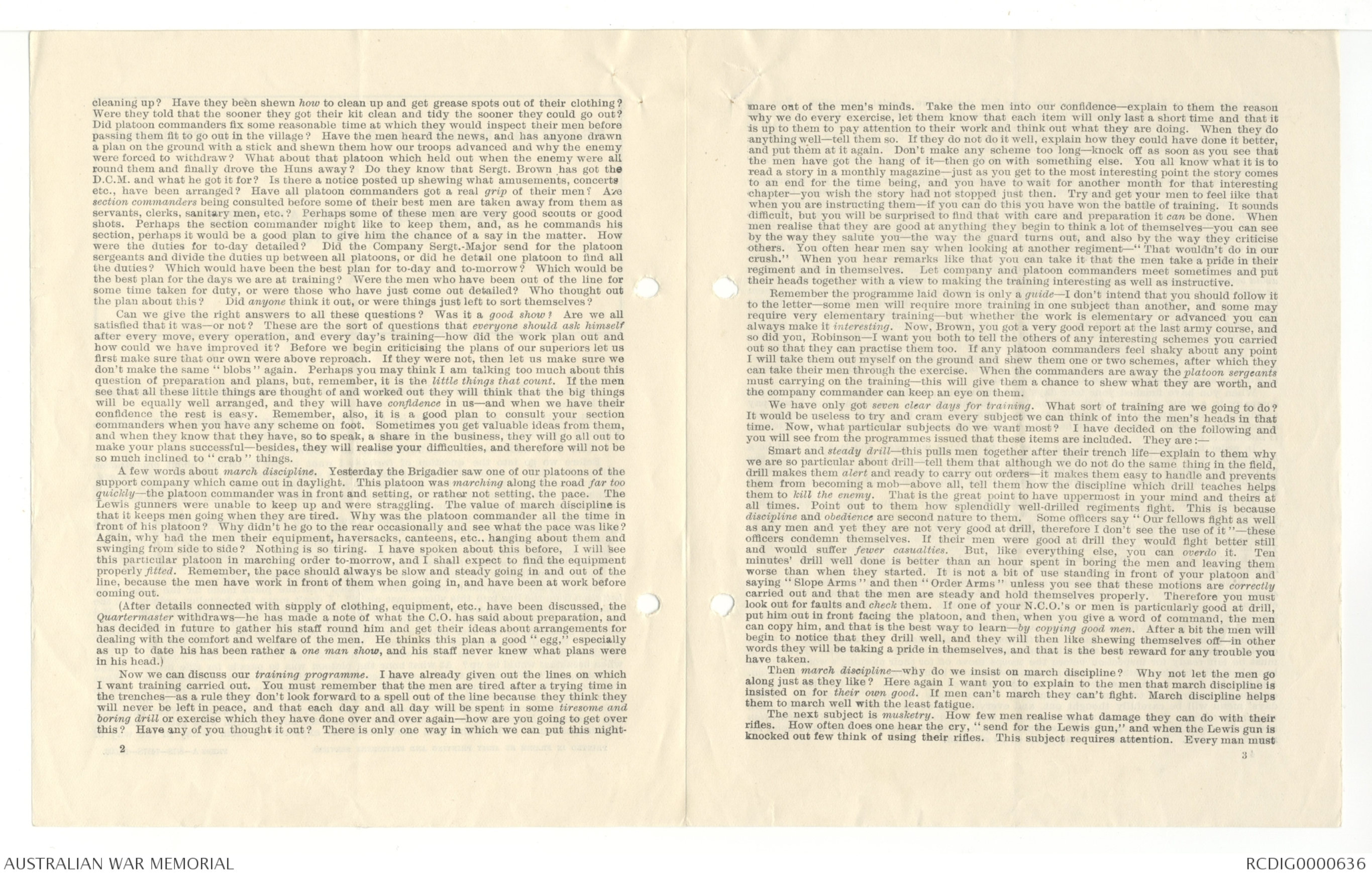
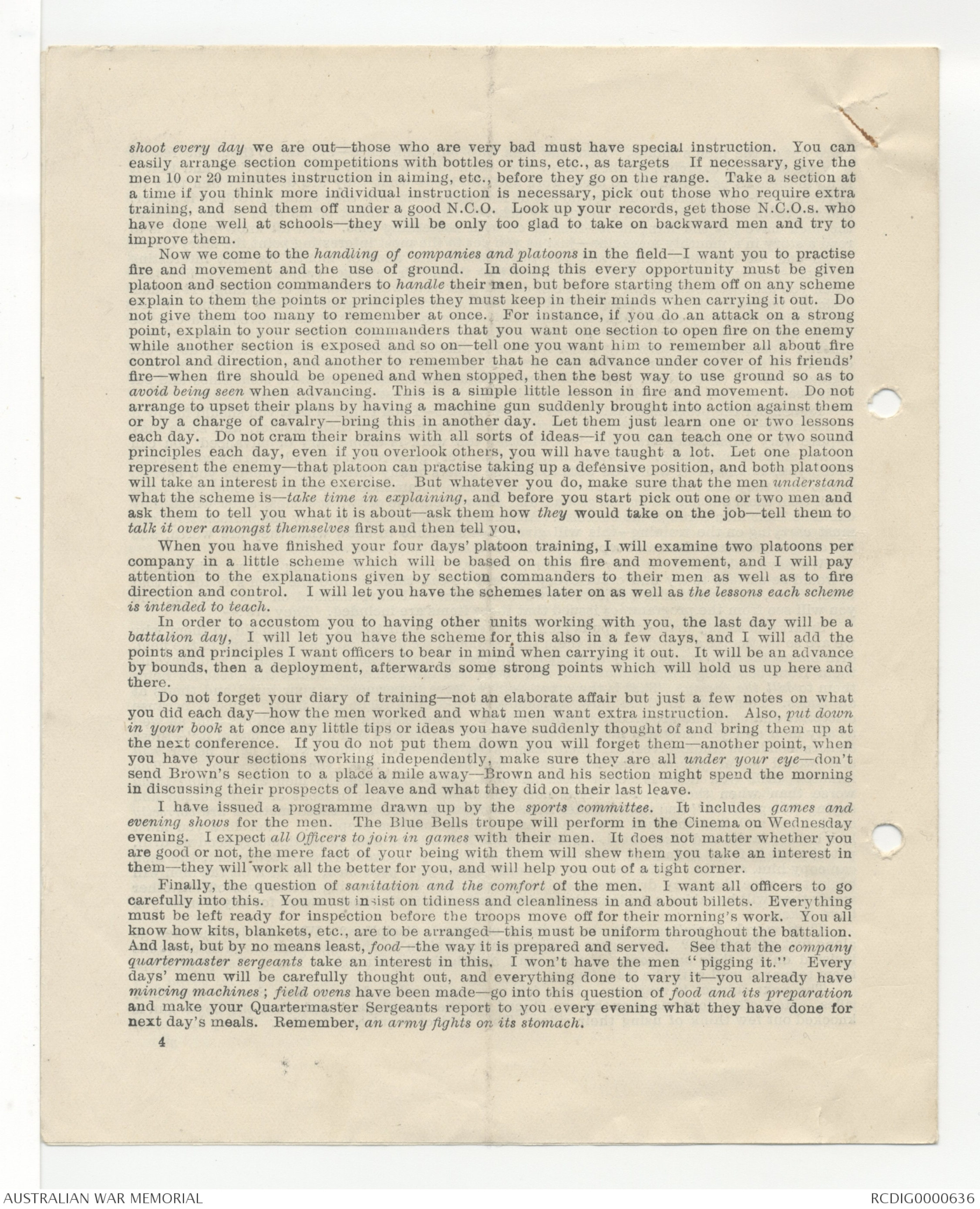
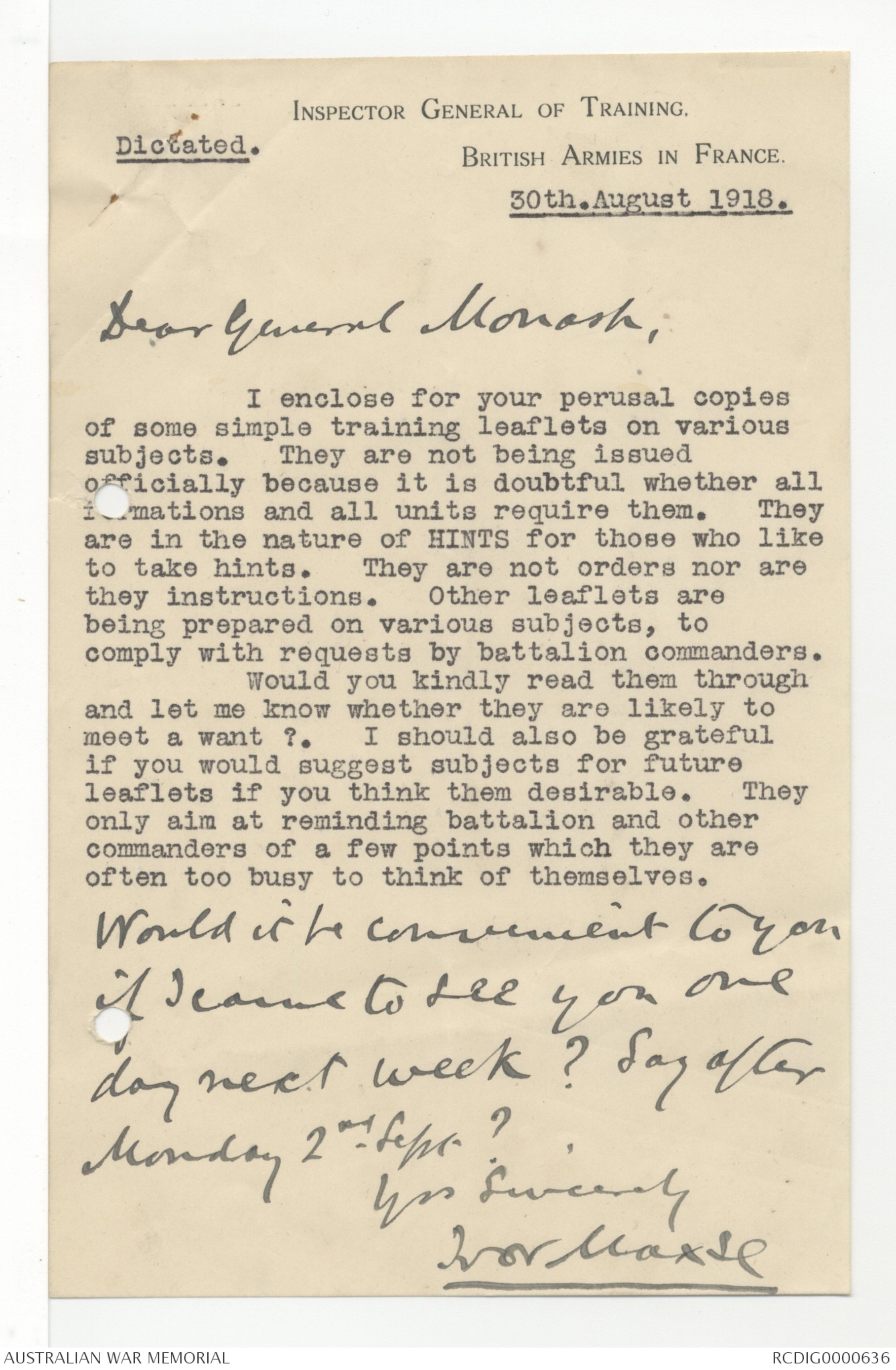
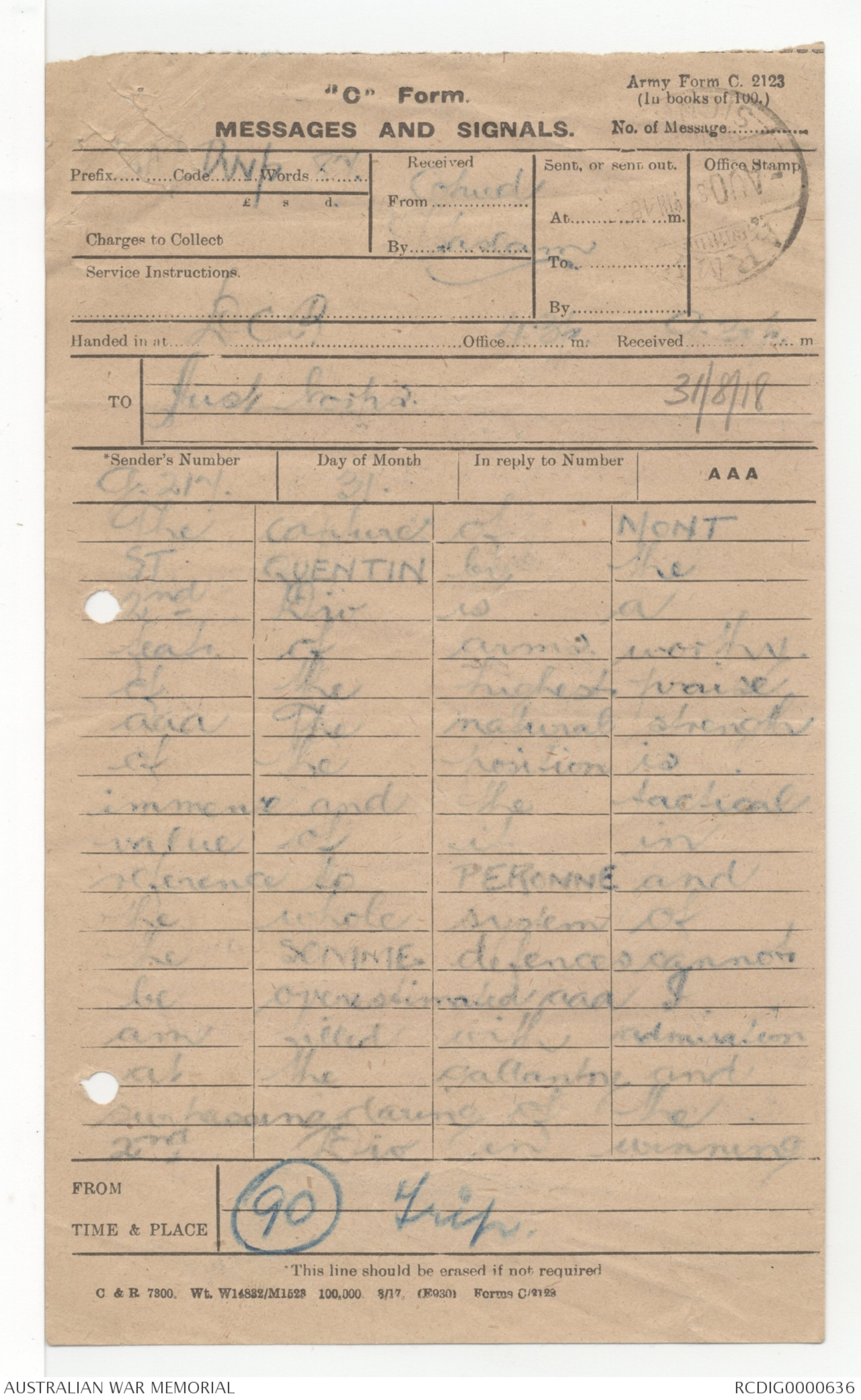
| TIME. | PLACE. | WORK. | REMARKS. |
| 8 a.m or 8.15 a.m |
Billets | Breakfast | After breakfast men clean up billets and leave kits tidy for inspection. The greater part of cleaning arms and equipment must be done the evening before. Platoon commanders inspect their billets. Sometimes the platoon sergeant should be detailed for this duty. |
| 9.15 a.m. or 9.30 a.m. |
Billets | All platoons fall in on parade in dress ordered for the day's training. Careful inspection by platoon commanders to see that men are properly turned out with arms, clothing and equipment clean and in good repair. Men to be practised in standing at attention for two or three minutes. |
Company commander inspects one or two platoons each day. Men who are not well turned out ordered to parade in the evening and show the article of equipment or clothing cleaned or mended. A platoon which has left its billets dirty or untidy should be sent back to clean them up and the time thus spent added to the day's work. |
| 9.45 a.m. | Billets or Vicinity. | All platoons 10 minutes smart steady drill of a ceremonial nature - to show itself off. |
Great attention to be paid to the way the men hold themselves in the ranks. Also to the handling of arms, and silence. |
| 10 a.m. | Billets or Vicinity. |
Company forms up. Two platoons march to the range. Two platoons march to training ground. March discipline to be practised, including halts, falling out, taking off equipment, falling in, marching at attention. On arrival at destination, platoon commander explains to section commanders the work to be done during the morning, and discusses faults noticed in march discipline. The section commanders gather their men round them and go over these points with their sections. This is done during a 10 minutes rest. |
Company commander mounted sees his plattons on the march and notes points in march discipline requiring attention. Then he rides to the range or to the training ground. Troops should march at attention when approaching or leaving billets, range, training ground, or other halting place. Organized singing on the march. Good singing will carry men a long way when they are tired. |
| 10.30 a.m. | Range | Two platoons shoot at improvised targets, glass bottles, etc. Sections from one platoon compete against sections of the other. Same with Lewis guns. Men not shooting practise rapid loading with ball ammunition; platoons compete with each other in this also. Judging distance competition and picking out different objects - men almost completely hidden, etc. No one should be idle. Those waiting to shoot must be kept busy by their own section commanders. Don't wait for orders. Get going on your own account. |
Arrangements must be made beforehand for every range practice. When not firing, men should be practised in using their eyes in some simple competition between sections. A good plan is to keep an old German cap and jacket for wear by a man who represents an enemy scout or sniper looking round the trunk of a tree, bank, etc. Section commanders encouraged to estimate ranges to places such as bridges, edge of woods, banks, hedges, farms, etc. |
| 10.30 a.m. | Training Ground |
Two platoons box respirator competition. One platoon represents gas cloud, and on whistle sounding rushes at other platoon and tries to prevent men putting on respirators. Platoon commander notes whether respirators have been correctly adjusted. Change over. 10 minutes. Bayonet fighting. 10 minutes. 10 minutes rest and smoke. |
Much of this section training under a good platoon commander can and should be made into a sporting event. |
| 11 a.m. | Training ground. |
A short demonstration in fire and movement and the use of ground, action of scouts and Lewis guns, 20 minutes. |
Company commander should superintend this. |
| 11.30 a.m. | Range. | Two platoons from training ground: practices similar to those carried out by the other two platoons: about 1 hour. |
When well trained, the section commanders carry on for an hour at different exercises without any platoon commander. |
| 11.30 a.m. | Training ground. | Two platoons from range. Short lecture by platoon commander on mutual support - how in defence one position should help the other. Explanation and illustration of this. Also simple illustration of fire and movement. Take 2 men and show how one can assist the other to get forward. 20 minutes. Bayonet fighting 10 minutes, then 10 minutes rest. |
Select any bit of ground and ask section commanders to put their sections in a position to cover another position on the flank. Let the Lewis gun section commander explain what he would do. See how flank sections arrange to protect themselves, &c. |
| TIME. | PLACE | WORK. | REMARKS. |
| 12.10PM | Training ground. |
Artillery and diamond formations, rapid deployments, speed at taking up fire positions. Section commanders exercised in fire orders, fire discipline, control, etc. 20 minutes to half an hour. Never keep men long at any one thing. Question them to see if they understand you. |
Practise getting into artillery formation from column of route. See that men get into good fire positions when they get down behind cover, etc. Have real live targets for section commanders to pick up. |
| 12.30 or 12.40 p.m. |
March back by platoons to billets and dismiss. March discipline as on the outward journey. During this march back the platoons should march past the battalion or company commander and show themselves off. |
Before dismissing, the platoon commander encourages his men by telling them if they did well at any exercise. He also points out where he expects to see an improvement to-morrow. Orders for the rest of the day should be given out to the men before they dismiss. |
|
| 1 p.m. | Dinners. | The quartermaster sergeant should be made responsible for the comfort of men at dinner. |
|
| 2.15 p.m. onwards. |
Recreational Games | Inter-section football matches, tug-of-war, rounders, etc. |
At 6 p.m. or some suitable hour a CONFERENCE of Platoon and Section Commanders;
subject- next day's work, &c.
NOTE.- This programme is not exhaustive. There are many other items of training which
will suggest themselves to company and platoon commanders. It must be remembered that no
training will be of real value unless the men take an interest in it. They won't take any interest
in it if it fatigues and bores them or if they have to go through the same programme day after
day. The success of a day's training depends on the trouble taken in its preparation. This is not
easy and requires a little imagination and much thought, but it is well worth while. The faces of
the men and the way they set about their work are the best signs of what has been done to make
their training interesting and instructive. Don't forget to have a plan up your sleeve for a wet
day and try to bring off a surprise by suddenly interpolating a new idea, a new exercise, a story
about recent fighting, or a bit of news out of the newspaper (including Punch), a story about a patrol,
or an aeroplane or a neighbouring unit. One item a day keeps your platoon cheerful and
expectant and makes them look up to you as altogether a superior being for whom they will
willingly die. Also you get an opportunity of telling them how to kill Huns at sight and thus
shorten the war.
Further copies of this Leaflet can be obtained direct on application to :--
I.G. Training, B.E.F., FRANCE.
TRAINING LEAFLET, No. 2.
I.G. TRAINING.
PROGRAMME OF TRAINING
FOR A BATTALION OUT OF
THE LINE FOR TEN DAYS.
|
WORK. |
REMARKS. |
|
| 1st Day. |
(a) This day is spent in overhauling kit and equipment and cleaning arms. Baths are allotted by companies. Clothing is cleaned and repaired. Grease-spots and stains are taken out with soap and water. Barbers, tailors, etc., are told off to visit companies at certain hours, so that everything is ready for them. The arrangements for day's programme have been made before the battalion leaves the line. Officers, N.C.O.s and men left out of the line have assisted in these preparations and in organizing everything so that the men start straight away. The 2nd in command has seen to the supply of cleaning materials for the companies. The quartermaster has arranged for clothing, etc., to replace worn-out and unserviceable articles. Everything has been foreseen and arrangements made under the guidance of the 2nd in command, to ensure that no time is wasted and the day's programme is worked out and communicated to company commanders before they leave the line. Organization of platoons and sections is checked. Section commanders' rolls examined and fresh ones made out where necessary. Understudies detailed. All arrangements were explained by the C.O. at a conference of company commanders in the trenches. |
There is more in the organization and preparation for this first day than is generally realized. The thing to aim at is to start men fair and square, clean and tidy on their ten days training. The men will probably be tired – all the more reason, therefore, why those who have been out of the line should have everything cut and dried for them. They can then get on with their work and finish it. The men should be told that as soon as they have cleaned themselves they can go out, but not till then. Platoon commanders should go round during the day and see them at work. Company commander goes into questions of interior economy, etc., with C.S.M. and C.Q.M.S. while platoon commanders platoons. Afterwards he goes round billets himself. |
| WORK | REMARKS | |
| 1st Day - continued | (b) In the afternoon or evening, the battalion commander holds a conference of company and platoon commanders, at which he outlines the programme of training for the next week, brings our points requiring special attention, goes into the detail of training for observers, scouts, and signallers, and organizes a class of instruction under the sergt.-major and assistant instructor for backward N.C.O.s. Hours of work, standing orders for billets, fires, etc., arrangements made for institutes and recreation for the men. Dress and general turn-out. System of arranging kits and arms in billets, daily inspections, sanitation. All the above has already been published in orders, but the C.O. discusses these orders and lays stress on points to which he wishes special attention paid, e.g., diluting, march discipline, sanitation, etc. |
By "platoon commander" is meant every officer OR N.C.O. who is acting as platoon commander on that date. There must be 16 officers or N.C.O.s representing 16 platoons at the C.O.'s conference. Otherwise some platoons will hear nothing of it. |
| 2nd Day | C.O. inspects billets, institutes, cookhouses, etc. and companies on parade. He sees whether the orders he issued at the conference yesterday are being carried out. During the inspection of the men he pays attention to neatness and uniformity in dress, the proper fitting of equipment, the state of repair of clothing and boots. Either before or after the C.O.'s inspection, platoons are taken in steady drill by their platoon commanders for half an hour. Arms are examined. Platoon commanders point out to their men any points noticed by the C.O., and arrange for a further inspection in the evening of those men who did not turn out as well as the others. Standing Orders are explained. Orders issued re allotment of baths, extra clothing, etc., and for completing the cleaning up process started yesterday. The platoon, less section commanders, is dismissed. The section commanders are re-issued with their section rolls and platoon commanders give them detailed instructions re carrying out certain orders. This is a day for throwing off trench weariness and resuming the pride which every soldier feels in himself and his battalion. The more amusement the better for everyone. |
C.O. see the billets. The Coy. falls in and is inspected by platoon commanders before arrival of C.O. This day's programme starts at 9.15 a.m. and should as far as the men are concerned end about 12.45 p.m. The rest of the day should be devoted to recreational exercises, completing the cleaning up and repairing started yesterday, and getting ready for to-morrow's training programme. Coy. and platoon commanders reconnitre ground in the vicinity of billets and hold a conference afterwards at which section commanders attend. To-morrow's training and the lessons to be learnt are discussed. Programme for next day is posted up on notice board so that men can see the work to be done. |
| Work. | Remarks. | |
| 3rd, 4th 5th & 6th days. |
Platoon and section training on lines similar to those shewn in specimen programme. The programme should be varied daily and cars taken in its preparation. Some simple scheme to demonstrate certain principles should be included in each day's instruction. Night patrols should be practised during this period. Drafts of new men should join their sections the moment the battalion comes out of the trenches. |
The battalion commander holds conferences on alternate days. Co., platoon and section commanders have a conference day after C.O.s conference. Officers who have done well at courses, etc., give lectures. The additional training of scouts, Lewis gunners (technical training), and rifle bombers should take place from 2.15 to 3.30 p.m. on alternate days. A certain amount of elementary training and instruction for new Lewis gunners, etc., should be done when the battalion is in the line. This is not allowed for in this programme. |
| 7th day | Reserve day. | The ''Reserve Day'' (7th) has no training allotted to it: it is kept free for (a) Repetition of any particular exercise or drill which the company commander has noticed as requiring more practice; or (b) In case the brigade or battalion commander has used up any other day for some special exercise. The training arranged for that particular day can then be carried out on the Reserve Day; or (c) The brigade or divisional commander can select this day (without interfering with the training programme) for any special scheme-such as an exercise with Tanks; or, (d) In case of bad weather interfering with a previous day's work, the programme can be carried out on this day. C.O.s should insist on company and platoon commanders having a programme ready for training in billets on a wet day, so that it can be put into force at short notice. Interesting schemes can easily be arranged with sand models, etc. |
| Work. | Remarks. | |
|
8th and 9th days |
8th, 9th, and 10th days- company training- the first hour should consist of intensive training under platoon commander in drill and musketry. At 10.30 a.m. they should move by platoons and assemble as a company, being met by the company commander to carry out a tactical scheme. |
The company tactical scheme can be carried out on a road if training ground is not available. |
| 10th day |
Battalion exercise or brigade exercise. Scheme to be prepared and issued in good time for its circulation down to section commanders. The scheme will depend on the available ground. If possible arrangements should be made for a Contact Aeroplane or Tanks to take part in the exercise. |
Remember that the success of all training depends on previous preparations and organization by battalion, company and platoon commanders. Everything must be thought out beforehand
|
Further copies of this Leaflet can be obtained direct on application to I.G. Training, B.E.F., FRANCE.
TRAINING LEAFLET, No. 3.
I.G. TRAINING.
BATTALION COMMANDER'S
CONFERENCE
Battalion commander's Conference on 1st day after coming out of the Line
for 10 days.
The following attend:- 2nd in Command, Adjutant, Company Commanders,
Platoon Commanders, Platoon Sergeants, Quartermaster.
The C.O. addresses his subordinates as follows :-
Before we go into the question of training I want to say something about organisation
and forethought. I notice that officers and N.C.O. s seldom take the trouble to think ahead.
If you do not do this you cannot be prepared; if you are not prepared you will make a muddle
of things. If you make a muddle your men lose confidence in you then you can take it that
you lose your fight before you start.
Yet there is a great fascination in organising and making plans and seeing your ideas working
out satisfactorily. Just think of the time and trouble it saves you. For instance, what a
godsend it is to move into a new billet and find everything ready and arrangements made for the
comfort and happiness of the men; isn’t it well worth while to go over and over again the plans
for a move and ask yourself if there is any danger of a hitch? If there is, do not rest satisfied
till you have put it right and until you can say that your show is foolproof.
Are company and platoon commanders satisfied with the plans made for the move of the
battalion from the line into this village last night? I don’t mean the battalion orders, but the
company, platoon and section plans which should have been based on the battalion orders. Did
the platoons know where they were to pick up guides to take them straight to their billet?
Did the guides go to the best place so that platoons couldn't go wrong before meeting their
guides? Was all this arranged beforehand? Were the platoon commanders told before they
dismissed their men what the orders were for the next day?—When reveillé would sound and
when breakfast would be up? At what hour the platoon was to parade for rifle inspection and
for baths, etc. Was there any hot soup or tea ready for the men before they turned in? What
was the Quartermaster Sergeant doing? Were there any lanterns at hand to light the men to
their billets, or did they trip over the men of other platoons who had turned in an hour or so
before? Was there much talking or shouting, or did everyone turn in quietly? What happened
this morning? Did section commanders go round and see how the men were getting ready for
rifle inspection? Did all the men know what was expected of them to-day in the way of
cleaning up? Have they been shewn how to clean up and get grease spots out of their clothing?
Were they told that the sooner they got their kit clean and tidy the sooner they could go out?
Did platoon commanders fix some reasonable time at which they would inspect their men before
passing them fit to go out in the village? Have the men heard the news, and has anyone drawn
a plan on the ground with a.stick and shewn them how our troops advanced and why the enemy
were forced to wihdraw? What about that platoon which held out when the enemy were all
round them and finally drove the Huns away? Do they know that Sergt. Brown has got the
D.C.M. and what he got it for? Is there a notice posted up showing what amusements, concerts
etc., have been arranged? Have all platoon commanders got a real grip of their men? Are
section commanders being consulted before some of their best men are taken away from them as
servants, clerks. sanitary men, etc.? Perhaps some of these men are very good scouts or good
shots. Perhaps the section commander might like to keep them, and, as he commands his
section, perhaps it would be a good plan to give him the chance of a say in the matter. How
were the duties for to-day detailed? Did the Company Sergt.-Major send for the platoon
sergeants and divide the duties up between all platoons, or did he detail one platoon to fnd all
the duties? Which would have been the best plan for to-day and to-morrow? Which would be
the best plan for the days we are at training? Were the men who have been out of the line for
some time taken for duty, or were those who have just come out detailed? Who thought out
the plan about this? Did anyone think it out, or were things just left to sort themselves?
Can we give the right answers to all these questions? Was it a good show? Are we all
satisfied that it was—or not? These are the sort of questions that everyone should ask himself
after every move, every operation, and every day's training—how did the work plan out and
how could we have improved it? Before we begin criticising the plans of our superiors let us
first make sure that our own were above reproach. If they were not, then let us make sure we
don't make the same “ blobs " again. Perhaps you may think I am talking too much about this
question of preparation and plans, but, remember, it is the little things that count. If the men
see that all these little things are thought of and worked out they will think that the big things
will be equally well arranged, and they will have confidence in us—and when we have their
confidence the rest is easy. Remember, also, it is a good plan to consult your section
commanders when you have any scheme on foot. Sometimes you get valuable ideas from them,
and when they know that they have, so to speak, a share in the business, they will go all out to
make your plans successful—besides, they will realise your difficulties, and therefore will not be
so much inclined to “ crab “ things.
A few words about march discipline. Yesterday the Brigadier saw one of our platoons of the
support company which came out in daylight. This platoon was marching along the road far too
quickly—the platoon commander was in front and setting, or rather not setting. the pace. The
Lewis gunners were unable to keep up and were straggling. The value of march discipline is
that it keeps men going when they are tired. Why was the platoon commander all the time in
front of his platoon? Why didn‘t he go to the rear occasionally and see what the pace was like?
Again, why had the men their equipment, haversacks, canteens, etc.. hanging about them and
swinging from side to side? Nothing is so tiring. I have spoken about this before, I will see
this particular platoon in marching order to-morrow, and I shall expect to find the equipment
properly fitted. Remember, the pace should always be slow and steady going in and out of the
line, because the men have work in front of them when going in, and have been at work before
coming out.
(After details connected with supply of clothing, equipment, etc., have been discussed, the
Quartermaster withdraws—he has made a note of what the C.0. has said about preparation, and
has decided in future to gather his staff round him and get their ideas about arrangements for
dealing with the comfort and welfare of the men. He thinks this plan a good “ egg," especially
as up to date his has been rather a one man show, and his staff never knew what plans were
in his head.)
Now we can discuss our training programme. I have already given out the lines on which
I want training carried out. You must remember that the men are tired after a trying time in
the trenches—as a rule they don't look forward to a spell out of the line because they think they
will never be left in peace, and that each day and all day will be spent in some tiresome and
boring drill or exercise which they have done over and over again—how are you going to get over
this? Have any of you thought it out? There is only one way in which we can put this nightmare
2
out of the men's minds. Take the men into our confidence—explain to them the reason
why we do every exercise, let them know that each item will only last a short time and that it
is up to them to pay attention to their work and think out what they are doing. When they do
anything well—tell them so. If they do not do it well, explain how they could have done it better,
and put them at it again. Don't make any scheme too long-—knock off as soon as you see that
the men have got the hang of it—then go on with something else. You all know what it is to
read a story in a monthly magazine-just as you get to the most interesting point the story comes
to an end for the time being, and you have to wait for another month for that interesting
chapter—you wish the story had not stopped just then. Try and get your men to feel like that
when you are instructing them—lf you can do this you have won the battle of training. It sounds
difficult, but you will be surprised to find that with care and preparation it can be done. When
men realise that they are good at anything they begin to think a lot of themselves—you can see
by the way they salute you—the way the guard turns out, and also by the way they criticise
others. You often hear men say when looking at another regiment—“ That wouldn't do in our
crush." When you hear remarks like that you can take it that the men take a pride in their
regiment and in themselves. Let company and platoon commanders meet sometimes and put
their heads together with a view to making the training interesting as well as instructive.
Remember the programme laid down is only a guide—I don't intend that you should follow it
to the letter—some men will require more training in one subject than another, and some may
require very elementary training—but whether the work is elementary or advanced you can
always make it interesting. Now, Brown, you got a very good report at the last army course, and
so did you, Robinson—I want you both to tell the others of any interesting schemes you carried
out so that they can practise them too. If any platoon commanders feel shaky about any point
I will take them out myself on the ground and shew them one or two schemes, after which they
can take their men through the exercise. When the commanders are away the platoon sergeants
must carrying on the training—this will give them a chance to shew what they are worth, and
the company commander can keep an eye on them.
We have only got seven clear days for training. What sort of training are we going to do?
It would be useless to try and cram every subject we can think of into the men's heads in that
time. Now, what particular subjects do we want most? I have decided on the following and
you will see from the programmes issued that these items are included. They are :—
Smart and steady drill—this pulls men together after their trench life—explain to them why
we are so particular about drill—tell them that although we do not do the same thing in the field,
drill makes them alert and ready to carry out orders–it makes them easy to handle and prevents
them from becoming a mob—above all, tell them how the discipline which drill teaches helps
them to kill the enemy. That is the great point to have uppermost in your mind and theirs at
all times. Point out to them how splendidly well-drilled regiments fight. This is because
discipline and obedience are second nature to them. Some officers say “ Our fellows fight as well
as any men and yet they are not very good at drill, therefore I don't see the use of it "—these
officers condemn themselves. If their men were good at drill they would fight better still
and would suffer fewer casualties. But, like everything else, you can overdo it. Ten
minutes’ drill well done is better than an hour spent in boring the men and leaving them
worse than when they started. It is not a bit of use standing in front of your platoon and
saying “Slope Arms " and then “Order Arms ” unless you see that these motions are correctly
carried out and that the men are steady and hold themselves properly. Therefore you must
look out for faults and check them. If one of your N.C.0.’s or men is particularly good at drill,
put him out in front facing the platoon, and then, when you give a word of command, the men
can copy him, and that is the best way to learn—by copying good men. After a bit the men will
begin to notice that they drill well, and they will then like showing themselves off-in other
words they will be taking a pride in themselves, and that is the best reward for any trouble you
have taken.
Then march discipline—why do we insist on march discipline? Why not let the men go
along just as they like? Here again I want you to explain to the men that march discipline is
insisted on for their own good. If men can't march they can't fight. March discipline helps
them to march well with the least fatigue.
The next subject is musketry. How few men realise what damage they can do with their
rifles. How often does one hear the cry, “ send for the Lewis gun," and when the Lewis gun is
blocked out few think of using their rifles. This subject requires attention. Every man must
3
shoot every day we are out—those who are very bad must have special instruction. You can
easily arrange section competitions with bottles or tins, etc., as targets If necessary, give the
men 10 or 20 minutes instruction in aiming, etc., before they go on the range. Take a section at
a time if you think more individual instruction is necessary, pick out those who require extra
training, and send them off under a good N.C.O. Look up your records, get those N.C.O.s. who
have done well, at schools—-they will be only too glad to take on backward men and try to
improve them.
Now we come to the handling of companies and platoons in the field—I want you to practise
fire and movement and the use of ground. In doing this every opportunity must be given
platoon and section commanders to handle their men, but before starting them off on any scheme
explain to them the points or principles they must keep in their minds when carrying it out. Do
not give them too many to remember at once., For instance, it you do .an attack on a strong
point, explain to your section commanders that you want one section to open fire on the enemy
while another section is exposed and so on—tell one you want him to remember all about fire
control and direction, and another to remember that he can advance under cover of his friends’
fire—when fire should be opened and when stopped, then the best way to use ground so as to
avoid being seen when advancing. This is a. simple little lesson in fire and movement. Do not
arrange to upset their plans by having a machine gun suddenly brought into action against them
or by a charge of cavalry—bring this in another day. Let them just learn one or two lessons
each day. Do not cram their brains with all sorts of ideas—if you can teach one or two sound
principles each day, even if you overlook others, you will have taught a lot. Let one platoon
represent the enemy—that platoon can practise taking up a defensive position, and both platoons
will take an interest in the exercise. But whatever you do, make sure that the men understand
what the scheme is—take time in explaining, and before you start pick out one or two men and
ask them to tell you what it is about—ask them how they would take on the job—tell them to
talk it over amongst themselves first and then tell you.
When you have finished your four days’ platoon training, I will examine two platoons per
company in a little scheme which will be based on this fire and movement, and I will pay
attention to the explanations given by section commanders to their men as well as to fire
direction and control. I will let you have the schemes later on as well as the lessons each scheme
is intended to teach.
In order to accustom you to having other units working with you, the last day will be a
battalion day, I will let you have the scheme for this also in a few days, and I will add the
points and principles I want officers to bear in mind when carrying it out. It will be an advance
by bounds. then a deployment, afterwards some strong points which will hold us up here and
there.
Do not forget your diary of training—not an elaborate affair but just a few notes on what
you did each day—how the men worked and what men want extra instruction. Also, put down
in your book at once any little tips or ideas you have suddenly thought of and bring them up at
the next conference. If you do not put them down you will forget them—another point, when
you have your sections working independently, make sure they are all under your eye—don't
send Brown’s section to a place a mile away—Brown and his section might spend the morning
in discussing their prospects of leave and what they did on their last leave.
I have issued a programme drawn up by the sports committee. It includes games and
evening shows for the men. The Blue Bells troupe will perform in the Cinema on Wednesday
evening. I expect all Officers to join in games with their men. It does not matter whether you
are good or not, the mere fact of your being with them will shew them you take an interest in
them—they will work all the better for you, and will help you out oi a tight corner.
Finally, the question of sanitation and the comfort of the men. I want all officers to go
carefully into this. You must insist on tidiness and cleanliness in and about billets. Everything
must be left ready for inspection before the troops move off for their mornings work. You all
know how kits, blankets, etc., are to be arranged—this, must be uniform throughout the battalion.
And last, but by no means least, food—the way it is prepared and served. See that the company
quartermaster sergeants take an interest in this. I won't have the men “ pigging it." Every
days’ menu will be carefully thought out, and everything done to vary it—you already have
mincing machines ; field ovens have been made—go into this question of food and its preparation
and make your Quartermaster Sergeants report to you every evening what they have done for
next day's meals. Remember, an army fights on its stomach.
4
INSPECTOR GENERAL OF TRAINING.
BRITISH ARMIES IN FRANCE.
Dictated.
30th.August 1918.
Dear General Monash,
I enclose for your perusal copies
of some simple training leaflets on various
subjects. They are not being issued
officially because it is doubtful whether all
formations and all units require them. They
are in the nature of HINTS for those who like
to take hints. They are not orders nor are
they instructions. Other leaflets are
being prepared on various subjects, to
comply with requests by battalion commanders.
Would you kindly read them through
and let me know whether they are likely to
'meet a want?. I should also be grateful
if you would suggest subjects for future
leaflets if you think them desirable. They
only aim at reminding battalion and other
commanders of a few points which they are
often too busy to think of themselves.
Would it be convenient to you
if I came to see you one
day next week? Say after
Monday 2nd Sept?
Yours Sincerely
Ivor Maxse
| "C" Form. MESSAGES AND SIGNALS. |
Army Form C. 2123 (In books of 100.) No. of Message |
||
| Prefix Code DWp Words 87 £ s d. Charges to Collect Service Instructions. |
Received From Copied By [[C Basham?]] |
Sent, or sent out. At m To By |
Office Stamp [*ARMY -AUO8 [[YIN48?]] SIGNALS*] |
| Handed in at LCR Office 4.30pm Received 9.30pm | |||
| TO | Aust Corps. 31/8/18 | ||
| *Sender's Number Ch 214 |
Day of Month 31 |
In Reply to Number | AAA |
The capture of MONT
ST QUENTIN by the
2nd Div is a
feat of arms worthy
of the highest praise
aaa The natural strength
of the position is
immense and the tactical
value of it in
general to PERONNE and
the whole system of
the SOMME defences cannot
be overestimated aaa I
am filled with admiration
at the gallantry and
sustained daring of the
2nd Div on winning
FROM
TIME & PLACE 90 Trip.
This line should be erased if not required
C & R 7800. Wt W14832/M1523 100,000 8/17 (E930) Forms C/2123
 Sam scott
Sam scottThis transcription item is now locked to you for editing. To release the lock either Save your changes or Cancel.
This lock will be automatically released after 60 minutes of inactivity.